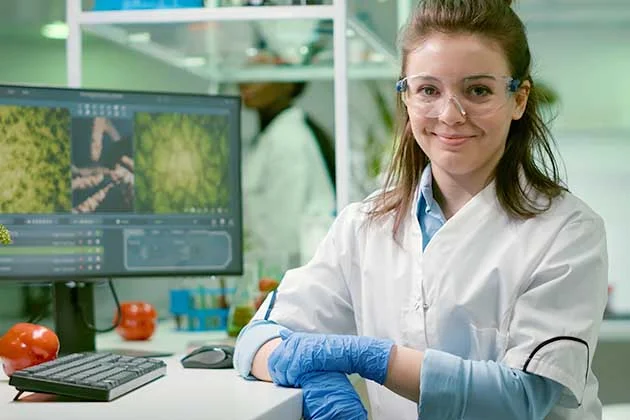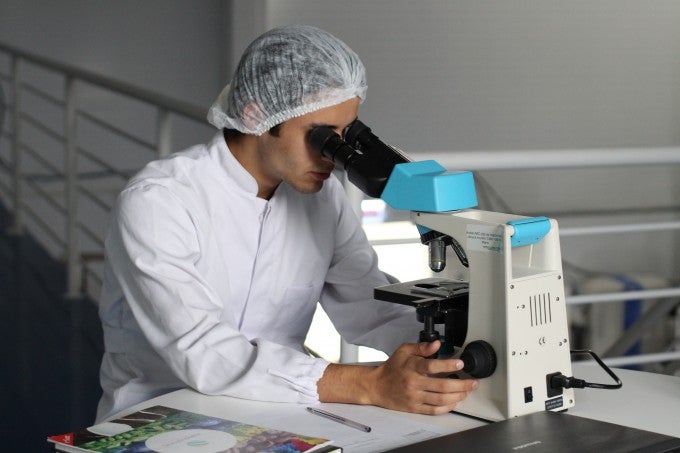In the modern age, biotechnology has emerged as a cornerstone of advancements in healthcare, heralding a new era of medical innovation. By combining biological science with cutting-edge technology, biotechnology has revolutionized the way we diagnose, treat, and prevent diseases. This article delves into the multifaceted world of biotechnology in healthcare, exploring its history, current applications, and future prospects.
Defining Biotechnology in Healthcare
Biotechnology, in the context of healthcare, refers to the use of biological systems, organisms, or derivatives to develop products and technologies that improve human health. Biotechnology in healthcare encompasses a wide range of practices, from genetic engineering and molecular diagnostics to biopharmaceuticals and regenerative medicine. By leveraging the intricate mechanisms of living organisms, biotechnology seeks to address some of the most pressing medical challenges of our time.
The Evolution of Biotechnology in Medicine
The journey of biotechnology in medicine is a testament to human ingenuity and perseverance. From the early days of using fermentation processes to produce antibiotics, to the advent of recombinant DNA technology, biotechnology has continuously evolved. Each milestone has paved the way for new therapies and diagnostic tools, ultimately transforming healthcare into a more precise and personalized field.

Historical Context
Understanding the historical context of biotechnology provides a foundation for appreciating its current and future applications in healthcare. The field has seen remarkable progress over the centuries, with each era contributing unique innovations and discoveries.
Early Beginnings: The Dawn of Biotechnology
The origins of biotechnology can be traced back to ancient civilizations that utilized fermentation to create bread, beer, and wine. However, the dawn of modern biotechnology began in the mid-20th century with the discovery of the structure of DNA by James Watson and Francis Crick. This breakthrough laid the groundwork for genetic engineering, allowing scientists to manipulate the genetic material of organisms in unprecedented ways.
Milestones in Biotechnology and Their Medical Applications
Several key milestones have marked the progression of biotechnology in healthcare. The development of recombinant DNA technology in the 1970s enabled the production of synthetic insulin, revolutionizing diabetes treatment. The Human Genome Project, completed in 2003, provided a comprehensive map of the human genome, opening new avenues for personalized medicine. More recently, advancements in CRISPR-Cas9 gene-editing technology have shown promise in treating genetic disorders.
Biotechnology and Modern Medicine
In contemporary healthcare, biotechnology plays an integral role, intersecting with various medical fields to enhance patient outcomes and streamline medical processes.
The Intersection of Biotechnology and Contemporary Healthcare
Biotechnology intersects with modern medicine in numerous ways, from drug development and disease diagnosis to personalized treatments and regenerative therapies. By integrating biotechnological innovations, healthcare providers can offer more effective and targeted interventions, ultimately improving patient care and reducing healthcare costs.
Key Fields within Medical Biotechnology
Medical biotechnology encompasses several key fields, each contributing unique advancements to healthcare. These include:
- Molecular Diagnostics: Techniques such as polymerase chain reaction (PCR) and next-generation sequencing (NGS) enable precise identification of genetic mutations and pathogens.
- Biopharmaceuticals: Biologics, including monoclonal antibodies and vaccines, provide targeted treatments for various diseases.
- Regenerative Medicine: Stem cell therapy and tissue engineering offer potential cures for conditions previously deemed incurable.
Advancements in Medical Biotechnology
The rapid pace of technological innovation has led to groundbreaking advancements in medical biotechnology, revolutionizing healthcare delivery and treatment modalities.
Revolutionary Innovations in Biotechnology
Recent innovations in biotechnology have ushered in a new era of medical possibilities. CRISPR-Cas9, a gene-editing technology, allows for precise modifications of the genetic code, offering potential cures for genetic disorders. CAR-T cell therapy, an immunotherapy approach, has shown remarkable success in treating certain types of cancer by reprogramming a patient’s own immune cells to target malignant cells.
Cutting-Edge Biotechnological Tools and Techniques
The advent of advanced biotechnological tools and techniques has significantly enhanced our ability to diagnose and treat diseases. Techniques such as single-cell RNA sequencing and CRISPR screens provide detailed insights into cellular processes, enabling the development of more effective therapies. Additionally, innovations like 3D bioprinting hold promise for creating customized tissues and organs for transplantation.
Biotechnology in Diagnostics
The integration of biotechnology in diagnostics has revolutionized the way diseases are detected and monitored, offering unprecedented accuracy and early detection capabilities.
Enhanced Diagnostic Techniques through Biotechnology
Biotechnological advancements have led to the development of enhanced diagnostic techniques that offer greater sensitivity and specificity. Molecular diagnostics, such as PCR and NGS, allow for the rapid and accurate detection of genetic mutations and infectious agents. Additionally, techniques like liquid biopsy enable non-invasive cancer detection by analyzing circulating tumor DNA in the bloodstream.
The Role of Biotechnology in Early Disease Detection
Early detection of diseases is crucial for improving treatment outcomes and patient survival rates. Biotechnology plays a pivotal role in this regard by enabling the identification of disease biomarkers at an early stage. For instance, advanced imaging techniques and molecular diagnostics can detect cancer, cardiovascular diseases, and neurodegenerative disorders before symptoms become apparent, allowing for timely intervention.

Biotechnology in Treatment
Biotechnology has revolutionized medical treatment, offering innovative therapies that target diseases at their molecular level and provide personalized solutions for patients.
Developing Targeted Therapies with Biotechnology
Targeted therapies, developed through biotechnological research, are designed to specifically attack disease-causing molecules without affecting healthy cells. Monoclonal antibodies, for instance, can precisely target cancer cells, minimizing collateral damage to surrounding tissues. This approach not only enhances treatment efficacy but also reduces side effects, improving patient quality of life.
Case Studies of Biotechnological Treatment Successes
Numerous case studies highlight the success of biotechnological treatments in various medical fields. For example, the development of Herceptin, a monoclonal antibody, has significantly improved survival rates for HER2-positive breast cancer patients. Similarly, gene therapies like Luxturna have provided groundbreaking treatments for inherited retinal diseases, restoring vision in affected individuals.
Personalized Medicine
Personalized medicine, driven by biotechnological advancements, tailors medical treatments to the individual characteristics of each patient, enhancing treatment effectiveness and minimizing adverse effects.
Tailoring Treatments to Individual Genetic Profiles
Personalized medicine leverages genetic information to tailor treatments to individual patients. By analyzing a patient’s genetic profile, healthcare providers can identify the most effective therapies and dosages, minimizing trial-and-error approaches. This personalized approach is particularly beneficial in oncology, where treatments can be customized based on the genetic mutations driving a patient’s cancer.
The Impact of Biotechnology on Personalized Healthcare
Biotechnology has significantly advanced the field of personalized healthcare, enabling more precise and effective treatments. Techniques like pharmacogenomics, which studies how genes affect a person’s response to drugs, allow for the customization of medication regimens. This not only improves therapeutic outcomes but also reduces the risk of adverse reactions, enhancing patient safety.
Gene Therapy and Biotechnology
Gene therapy represents one of the most promising frontiers in biotechnology, offering potential cures for genetic disorders by directly addressing the root cause of diseases.
Understanding Gene Therapy and Its Applications
Gene therapy involves the introduction, removal, or alteration of genetic material within a patient’s cells to treat or prevent disease. This technique holds immense potential for treating a wide range of genetic disorders, including cystic fibrosis, muscular dystrophy, and hemophilia. By correcting defective genes, gene therapy aims to provide long-lasting or even permanent cures.
Recent Breakthroughs and Ongoing Challenges
Recent breakthroughs in gene therapy, such as the development of CRISPR-Cas9, have demonstrated the feasibility of precise genetic modifications. However, the field also faces several challenges, including ensuring the safety and efficacy of treatments, addressing ethical concerns, and navigating regulatory hurdles. Ongoing research and clinical trials continue to refine gene therapy techniques and expand their applications.
Biotechnology in Drug Development
Biotechnology has revolutionized drug development, enabling the creation of novel therapies that target diseases at their molecular level and offer improved efficacy and safety profiles.
Accelerating Drug Discovery and Development
Biotechnological advancements have accelerated the drug discovery and development process, reducing the time and cost associated with bringing new therapies to market. Techniques such as high-throughput screening and computational modeling allow for the rapid identification of promising drug candidates. Additionally, biopharmaceuticals, including monoclonal antibodies and recombinant proteins, offer targeted treatment options for various diseases.
The Role of Biotech Companies in Pharmaceutical Innovations
Biotech companies play a crucial role in driving pharmaceutical innovations, leveraging their expertise in molecular biology and genetic engineering to develop cutting-edge therapies. Companies like Amgen, Genentech, and Biogen have been at the forefront of biotechnological advancements, developing groundbreaking treatments for conditions such as cancer, multiple sclerosis, and rheumatoid arthritis.
Regenerative Medicine and Biotechnology
Regenerative medicine, underpinned by biotechnological research, aims to restore or replace damaged tissues and organs, offering new hope for patients with chronic and debilitating conditions.
Stem Cell Research and Its Medical Applications
Stem cell research is a cornerstone of regenerative medicine, offering the potential to generate healthy tissues and organs for transplantation. Embryonic stem cells and induced pluripotent stem cells (iPSCs) can differentiate into various cell types, providing a renewable source of cells for treating conditions such as spinal cord injuries, heart disease, and diabetes. Ongoing research continues to explore the therapeutic potential of stem cells in regenerative medicine.
Advances in Tissue Engineering and Regenerative Therapies
Tissue engineering combines cells, scaffolds, and bioactive molecules to create functional tissues for transplantation. Advances in this field have led to the development of artificial skin, cartilage, and even organoids—miniature, simplified versions of organs grown in vitro. These breakthroughs hold promise for addressing the shortage of donor organs and improving outcomes for patients requiring tissue replacement.
Biotechnology in Vaccine Development
Biotechnology has transformed vaccine development, enabling the creation of effective and safe vaccines that protect against a wide range of infectious diseases.
Innovative Approaches to Vaccine Creation
Biotechnological techniques have revolutionized vaccine creation, leading to the development of novel vaccines that offer improved protection and safety. Methods such as recombinant DNA technology, mRNA vaccines, and viral vector vaccines allow for the rapid and precise development of vaccines against emerging infectious diseases. These innovative approaches have been instrumental in combating recent outbreaks, including the COVID-19 pandemic.
Biotechnology’s Role in Combating Infectious Diseases
Biotechnology plays a critical role in the fight against infectious diseases, enabling the rapid development and deployment of vaccines. The success of mRNA vaccines, such as those developed by Pfizer-BioNTech and Moderna for COVID-19, underscores the potential of biotechnological innovations in responding to global health emergencies. These advancements not only provide immediate protection but also pave the way for future vaccine development efforts.
Biotechnology and Cancer Treatment
Biotechnological in healthcare advancements have revolutionized cancer treatment, offering novel therapies that target cancer cells with precision and efficacy.
Novel Biotechnological Approaches to Oncology
Biotechnology has introduced several novel approaches to oncology, including targeted therapies, immunotherapies, and gene editing. Targeted therapies, such as tyrosine kinase inhibitors, specifically attack cancer-causing molecules, while sparing healthy cells. Immunotherapies, including CAR-T cell therapy and immune checkpoint inhibitors, harness the body’s immune system to fight cancer. These innovative treatments have transformed the landscape of cancer care, offering new hope for patients.
The Future of Cancer Treatment with Biotechnology
The future of cancer treatment with biotechnology looks promising, with ongoing research and clinical trials exploring new therapeutic avenues. Advances in precision medicine, liquid biopsy, and cancer vaccines hold the potential to further improve cancer detection, treatment, and prevention. As biotechnological innovations continue to evolve, they will play an increasingly pivotal role in the fight against cancer.
Ethical Considerations
The rapid advancement of biotechnology in healthcare raises several ethical considerations that must be addressed to ensure responsible and equitable use of these technologies.
Navigating Ethical Challenges in Medical Biotechnology
Biotechnological advancements often outpace the development of ethical guidelines, creating a complex landscape of ethical challenges. Issues such as genetic privacy, informed consent, and the potential for unintended consequences must be carefully navigated. Ethical frameworks and regulatory oversight are essential to ensure that biotechnological innovations are used responsibly and for the benefit of all.
Public Concerns and Regulatory Frameworks
Public concerns about biotechnology in healthcare often center around issues of safety, accessibility, and ethical implications. Regulatory frameworks, such as those established by the FDA and EMA, play a critical role in addressing these concerns by ensuring that biotechnological products undergo rigorous testing and evaluation. Transparent communication and public engagement are also crucial in building trust and addressing societal concerns.

The Future of Biotechnology in Healthcare
The future of biotechnology in healthcare is poised to bring about transformative changes, driven by ongoing research, emerging technologies, and a commitment to improving global health outcomes.
Emerging Trends and Future Prospects
Several emerging trends are set to shape the future of biotechnology in healthcare, including advancements in gene editing, synthetic biology, and artificial intelligence. These innovations hold the potential to revolutionize disease treatment, prevention, and diagnosis. Additionally, the convergence of biotechnology with other fields, such as nanotechnology and bioinformatics, will open new avenues for medical research and applications.
Potential Global Health Impacts of Biotechnological Advances
The global health impact of biotechnological advances cannot be overstated. By addressing pressing health challenges, such as infectious diseases, genetic disorders, and chronic conditions, biotechnology has the potential to significantly improve health outcomes worldwide. As these technologies become more accessible and affordable, they will play a crucial role in reducing health disparities and enhancing the quality of healthcare for all.
Conclusion
Summarizing the Impact of Biotechnology in Healthcare
Biotechnology has had a profound impact on healthcare, biotechnology in healthcare revolutionizing the way we diagnose, treat, and prevent diseases. From personalized medicine and regenerative therapies to advanced diagnostics and targeted treatments, biotechnological innovations have transformed medical practice and improved patient outcomes.
Looking Ahead: The Role of Biotechnology in Future Medical Innovations
As we look to the future, biotechnology in healthcare will continue to play a pivotal role in medical innovations, driving advancements that improve health and extend lives. By embracing these technologies and addressing the associated ethical and regulatory challenges, we can harness the full potential of biotechnology to create a healthier, more equitable world.






